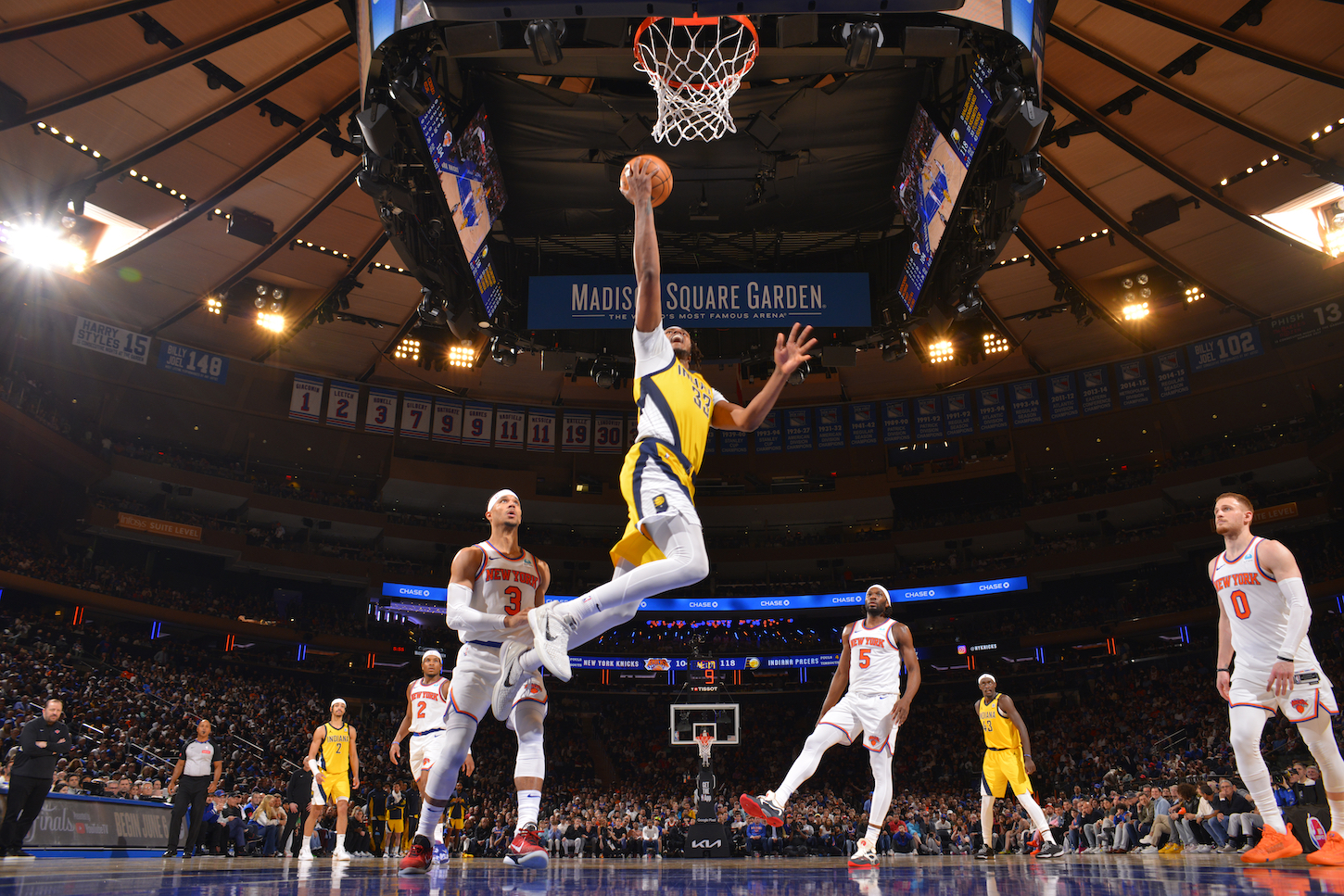The Indiana Pacers made 76.3 percent of their shots in the first half of their Game 7 wipeout of the hosting New York Knicks on Sunday. They attempted 38 field goals in the half, and made a preposterous 29 of them. Let's just start with that. Seventy-six percent shooting for an entire half just doesn't happen in an NBA game. Whether it is a Game 7 or any other type of game. That's the best any team has ever shot across a half in any playoff game, ever.
To shuffle the order of words slightly, 76.3 percent shooting doesn't just happen. It isn't a weather event. Indiana made 76.3 percent of its shots in the first half for reasons: because, for one thing, it has a high-powered, whirring offense stuffed with efficient scorers, by some measures the best offense in league history. Tyrese Haliburton and Pascal Siakam in particular were spectacular in Game 7; the Pacers were patient and razor-sharp in creating good, high-percentage shots, but then whenever they couldn't, Haliburton or Siakam would go right ahead and make a bad, low-percentage shot: a tough turnaround jumper over a defender's arms, a sidestepping 18-footer to rescue a possession in its final seconds. But also, Indiana made more than three-quarters of its shots for an entire half of Game 7 because the New York Knicks were playing like their shoes were made of lead. I have never seen a more clearly exhausted NBA team in my life.
Extreme exhaustion is the only state in which the Knicks' postseason run could end, as their already short rotation, run into the ground by coach Tom Thibodeau, got progressively shortened and battered by injuries—to Julius Randle before the playoffs, and then to Bojan Bogdanovic, Mitchell Robinson, OG Anunoby, and Josh Hart. They weren't even halfway through their first-round series against the Philadelphia 76ers by the time their ability to grind out the decisive plays at the ends of games seemed supernatural; whenever the bill for that wizardry came due, it was going to look ghastly and sudden, a green ribbon untied at last, a head rolling onto the floor.
The Knicks brought their exhaustion with them to this series, but Indiana pounced on it and deepened it, ruthlessly. The youthful Pacers, hardly tested at all in their first-round series against a bereft Milwaukee Bucks team, seemed purpose-built for the job, with their manic tempo, constant motion, and distributed firepower. Their platoon of tireless, pesky perimeter defenders (horrible skittering plus-minus demon T.J. McConnell, the most loathsome basketball player imaginable, gets lots of bitterly grudging credit here) made them uniquely suited to destroy a team super-duper insanely over-reliant on the constant desperate grinding of a tiny scoring guard shouldering a world-historic share of the scoring and playmaking load. Jalen Brunson, a superhero against the Sixers and throughout the six preceding games in this series, shot 6-for-17 in Game 7, trudging through hip-deep mud the entire time; add together his elevation on all 17 of those shot attempts put together and I'm not sure it's enough to get him over a MacBook.
At various moments you could convince yourself the game might get, and remain, close enough for the Knicks to once again scramble the highest-leverage moments in their favor. For a chunk of the first half, a game Alec Burks kept them within screaming distance pretty much by himself; after halftime the hosts gained some traction by hectoring Indiana's ballhandlers early in possessions, but they plainly didn't have the legs to keep it up. That's the damnable thing about losing the game's first 15 minutes by 22 points: Redline on effort for half a quarter, win it by a dozen, and you're still down double figures, plus worn out.
At the end of each successively feebler Knicks push, the Pacers would calmly, and with ever greater confidence, breeze out of reach again. A comparably cooled-off second half still saw them hitting 58.5 percent of their shots; they finished at 67.1 percent for the game, the highest figure ever posted across an entire playoff game. Brunson broke his hand late in the third quarter, with the Pacers leading by 18, and then you couldn't fool yourself anymore.






